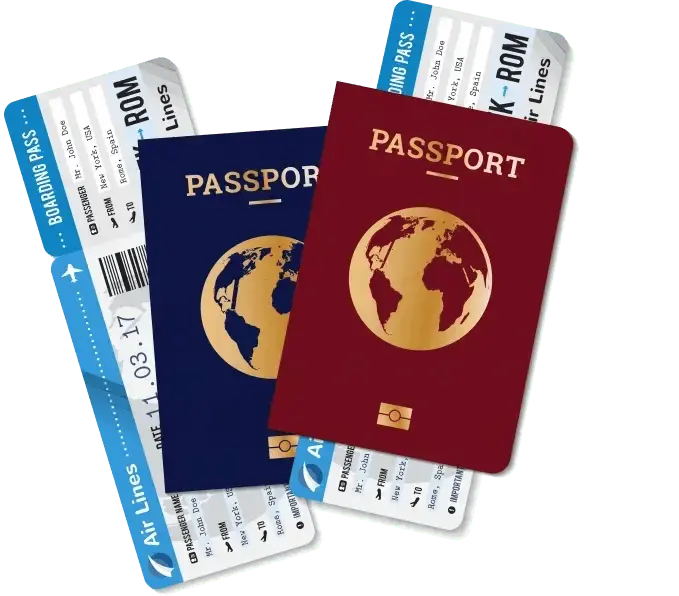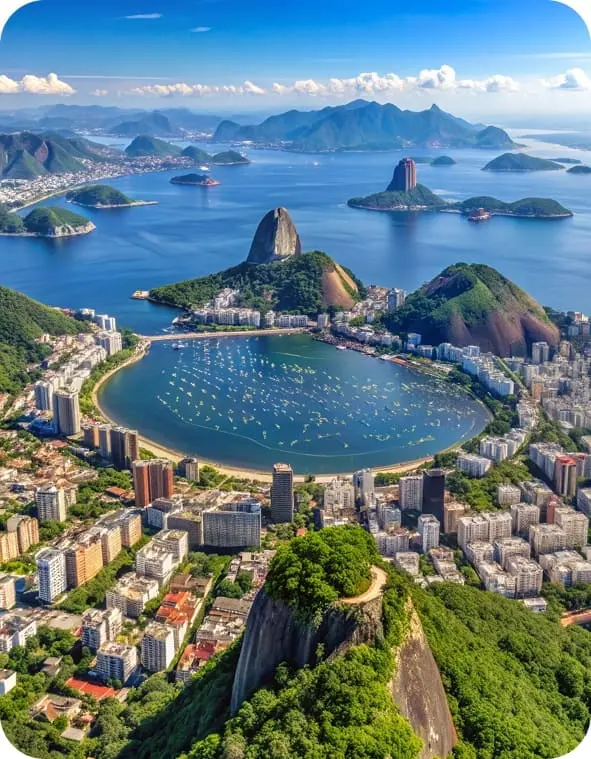Population
GDP (per capital)
Visa-Free Countries
GDP (purchasing power parity)
-
Immigrating to Brazil Through Investment (2025)
-
As of 2025, Brazil offers foreign investors a clear path to permanent residency through the VIPER program (Visa de Residência Permanente por Investimento), often called the Brazilian Golden Visa. Designed to attract capital and innovation, the program reflects Brazil’s focus on economic development through strategic migration.
This article provides a concise, up-to-date guide for those looking to secure residency in Brazil by investing in business, real estate, or key growth sectors. - Main Industries
- Agriculture and Agribusiness
- Mining and Mineral Extraction
- Oil and Gas Industry
- Automotive and Machinery Manufacturing
- Food and Beverage Processing
- Textile and Footwear Industry
- Financial and Banking Services
- Tourism and Hospitality Sector

BRT (UTC−2 to −5)
8,515,767 km2
Real (R$)
Brasília
Portuguese

Understanding the VIPER Program
The VIPER program—short for Visa de Residência Permanente por Investimento—is Brazil’s flagship initiative granting permanent residency to foreign nationals who contribute to the country’s economy through approved investments. Launched as part of Brazil’s broader strategy to attract global talent and capital, the program offers a stable and flexible route for those seeking long-term residence.
Applicants may choose from several investment pathways:
- Business Investment: Establishing or injecting capital into a Brazilian enterprise, with a focus on job creation and economic value.
- Real Estate: Acquiring residential or commercial property, subject to regional thresholds.
- Startup Capital: Backing innovation-driven ventures, particularly in technology, sustainability, and strategic sectors.
Each option has specific criteria and benefits, allowing investors to align their residency plans with personal or professional goals.
Investment Requirements
To qualify for permanent residency under the VIPER program in 2025, applicants must meet specific financial thresholds based on the type of investment chosen. Each route is designed to support Brazil’s economic priorities while offering flexibility for different investor profiles.
- Business Investment: A minimum of BRL 500,000 (around USD 100,000) must be invested in a Brazilian enterprise. In addition, investors are expected to generate employment for local citizens, aligning with Brazil’s broader development goals.
- Real Estate Acquisition: Property buyers must commit at least BRL 1,000,000 (approximately USD 200,000). However, this threshold is reduced to BRL 700,000 (about USD 140,000) for real estate located in Brazil’s North and Northeast regions, where the government encourages economic stimulation.
- Startup Funding: Those investing in early-stage or innovation-driven companies may qualify with a lower contribution of BRL 150,000 (roughly USD 30,000), particularly when directed toward technology, sustainability, or other high-impact sectors.
These entry points reflect Brazil’s efforts to attract both large-scale and agile investments that drive growth and diversification.

-
Application Process
- Applying for residency through investment in Brazil involves a few essential steps, all of which require careful planning and attention to detail.
-
Preparation:
Prospective investors must first draft a detailed business plan that clearly demonstrates how the proposed investment will contribute to Brazil’s economic landscape—whether through job creation, innovation, or regional development. It's equally important to ensure full legal compliance, including adherence to local business regulations and immigration guidelines. -
Submission:
Once preparations are complete, applicants must gather all supporting documents, such as proof of funds, the business plan, and any certifications verifying legal and financial compliance. These materials are then submitted to the Ministry of Justice and Public Security, the body responsible for processing residency applications. -
Processing Time:
In most cases, decisions are issued within 15 business days, provided the file is complete and meets all criteria.
Post-Approval Obligations
Post-Approval Obligations
Gaining permanent residency through Brazil’s VIPER program is a significant achievement, but it also comes with ongoing responsibilities. To ensure your status remains valid, and to make the most of your new legal standing, several obligations must be met after approval.
Including Immediate Family Members
Brazil’s residency-by-investment route offers a generous family reunification policy. You can extend residency rights to:
- Your spouse or legally recognized partner
- Dependent children (typically under 18, or up to 24 if enrolled in full-time education)
- Dependent parents in some cases
These family members will receive the same residency rights as the principal applicant, with access to public services, education, and employment opportunities.
Maintaining Your Investment
One of the core conditions for preserving your residency is the continued maintenance of your qualifying investment:
- For business investors, this means keeping the company operational and fulfilling any job creation commitments outlined in your business plan.
- Real estate owners must retain ownership of the property for the period stipulated by immigration authorities.
- Those who invest in startups or innovative sectors should ensure the venture remains active and aligned with the purpose of the visa.
Understanding Tax Responsibilities
Once you obtain permanent residency, you are considered a fiscal resident and become subject to Brazil’s tax regime. Key points include:
- Progressive Income Tax: Rates range from 0% to 27.5%, depending on your earnings.
- Global Income Declaration: Residents must report and may be taxed on income earned both in Brazil and abroad.
- CPF Requirement: The Cadastro de Pessoas Físicas (CPF) number is essential for all tax matters, including filing returns, opening bank accounts, and conducting business.

Pathway to Citizenship
For many investors, obtaining permanent residency is just the first step toward a deeper, long-term connection with Brazil. The VIPER program not only grants the right to live and work in the country but also opens the door to full Brazilian citizenship under specific conditions.
Residency Duration Requirement
Permanent residents who maintain four years of continuous legal residence in Brazil become eligible to apply for naturalization. During this period, the applicant must demonstrate genuine ties to the country, which may include business activity, property ownership, or community integration. Fluency in Portuguese and a clean criminal record, both locally and internationally, are typically required as part of the naturalization process.
In certain cases—such as marriage to a Brazilian citizen, or parenthood of a Brazilian-born child—this period may be shortened.
Dual Citizenship Policy
Brazil recognizes and permits dual citizenship, meaning that naturalized individuals are not required to renounce their original nationality. This flexibility allows investors to fully integrate into Brazilian society while preserving their legal ties to their country of origin.
Be aware, however, that dual citizenship regulations vary by country, so it’s important to confirm whether your home nation allows multiple nationalities before proceeding.
Benefits of the VIPER Program
Choosing Brazil’s VIPER program is not only a gateway to permanent residency but also an opportunity to build a life in one of the most economically and culturally dynamic nations in Latin America. The program offers a broad range of advantages for investors and their families.
Permanent Residency with Stability
Successful applicants receive indefinite residence status, providing the right to live, study, and remain in Brazil without time limitations. This stability is particularly valuable for those seeking to establish long-term roots—whether through business, family life, or personal growth.
Unrestricted Work and Business Rights
VIPER holders are automatically granted full work authorization, allowing them to be employed or to run their own businesses across all sectors of the Brazilian economy. This unrestricted access removes the bureaucratic barriers often associated with employment-based visas.
Enhanced Global Mobility
Although the VIPER itself is a residency visa, it leads to naturalization eligibility, and with it, the possibility of obtaining a Brazilian passport. As of 2025, Brazilian citizens enjoy visa-free or visa-on-arrival access to over 170 countries, enhancing international travel and business flexibility.
Access to Emerging Markets
With its vast consumer base, natural resources, and growing innovation hubs, Brazil offers diverse economic opportunities across sectors like agriculture, energy, tech, and real estate. The VIPER visa gives investors direct access to one of the world’s largest and most promising emerging economies.

Considerations and Challenges
While Brazil’s VIPER program offers a promising route to residency and long-term opportunity, investors should be mindful of certain practical and strategic challenges that may arise along the way. A well-informed approach helps ensure that expectations align with the realities of investing and living in Brazil.
Economic Volatility: Like many emerging markets, Brazil is influenced by global economic shifts. Currency fluctuations, inflationary trends, and changing interest rates can all impact the performance of your investment. It’s important to conduct thorough financial due diligence and seek professional advice to safeguard returns and assess potential risks over the medium to long term.
Legal and Regulatory Obligations: Navigating Brazil’s regulatory landscape requires care and compliance. Investors must operate within the framework of national immigration laws and commercial regulations, which may vary by sector and region. Engaging a qualified legal advisor with expertise in both immigration and corporate law is strongly recommended to ensure a smooth and lawful process.
Cultural and Social Adaptation: Beyond the legal and financial dimensions, successful relocation also depends on the ability to adapt culturally and socially. Brazil is known for its warmth and diversity, but language barriers, administrative processes, and differences in business etiquette may require adjustment. Embracing these dynamics can enrich your experience and strengthen personal and professional relationships.
Conclusion
Immigrating to Brazil through the VIPER program presents a unique opportunity to secure permanent residency while actively participating in one of the world’s most vibrant and evolving economies. By meeting the investment requirements and adhering to legal obligations, foreign investors can unlock significant benefits—not only for themselves but also for their families. Although challenges such as economic fluctuations and cultural adaptation exist, thorough preparation and professional guidance can help navigate these complexities with confidence. Ultimately, Brazil offers a promising path for those seeking to combine strategic investment with a rich and diverse lifestyle.
FAQ about Investment in Brazil
What is the VIPER program?
The VIPER program (Visa de Residência Permanente por Investimento) is Brazil’s investor visa that grants permanent residency to foreigners who make qualifying investments in business, real estate, or startups.
What is the minimum investment required?
Investment thresholds vary: BRL 500,000 (~USD 100,000) for businesses, BRL 1,000,000 (~USD 200,000) for real estate (discounted to BRL 700,000 in certain regions), and BRL 150,000 (~USD 30,000) for startups.
How long does it take to process the investor visa application?
Typically, the application is processed within about 15 business days after submitting all required documents.
Can family members be included in the application?
Yes, the program allows inclusion of immediate family members such as spouses and dependent children under the same residency status.
When can I apply for Brazilian citizenship?
After maintaining uninterrupted residency for four years, investors can apply for naturalization, provided they meet language and legal requirements.
Looking for expert visa support?
PROGRAM MATCH
Compare the different programs in a nutshell and discover their features
PROGRAM COST
Check the cost estimates for each offered program
PROGRAM MAP
Explore the power of global mobility for every passport in the world
